|
|
|
Sort Order |
|
|
|
Items / Page
|
|
|
|
|
|
|
| Srl | Item |
| 1 |
ID:
131095
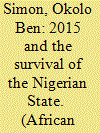

|
|
|
|
|
| Publication |
2014.
|
| Summary/Abstract |
Nigeria is currently faced with serious domestic challenges. While the state is not officially at war, it is standing on the precipice, especially with the eruption of violence occasioned by the emergence of the Boko Haram sect and the tenuous peace in the Niger Delta. With the 2015 general elections on the horizon, fears of further violence and disintegration are rife, more so because of the debate over who occupies the Presidential Villa at Abuja. President Goodluck Jonathan, a southerner, seems poised for a comeback even amidst the vociferous challenge posed by the political elites of northern Nigeria. This article looks at the different scenarios that might play out in 2015. It analyses the challenges of the survival of the Nigerian state, and makes some policy recommendations that Nigeria and its people need to put into place in order to ensure its survival beyond 2015.
|
|
|
|
|
|
|
|
|
|
|
|
|
|
|
|
| 2 |
ID:
086170
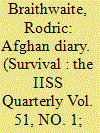

|
|
|
|
|
| Publication |
2009.
|
| Summary/Abstract |
In early September 2008 Rodric Braithwaite travelled to Afghanistan to 'see some of the places (Herat, Pandsher, Salang), talk to some Afghans, and check on the stories my Russian contacts (who go back there all the time) tell me about the positive attitude the Afghans now have towards the Russians'. He kept notes as a record for his own use, and to send back to his family on a daily basis to reassure them that he hadn't been kidnapped. He kindly shared them with Survival, and we present a version abridged to fit the available space. Braithwaite did not meet the kind of people that official visitors to Afghanistan usually meet. He drew a number of conclusions from his conversations:
First, the common belief among Afghans that they were better off under the Russians, and that the last Communist President Najibullah was a better leader than Karzai, may not reflect historical reality; but it bodes ill for the coalition's overall aims. Secondly, the Russian effort in Afghanistan was frustrated above all by their inability to control the frontier with Pakistan: a task which may well turn out to be even harder for the coalition. Thirdly, although the Russians were not defeated militarily in Afghanistan, any more than the Americans were in Vietnam, both the Russians and the Americans failed entirely to achieve their political objectives. The British, by contrast, who ended their nineteenth-century Afghan wars with military victory, sensibly settled for their minimum objective: a monopoly of Afghan foreign policy, which lasted for 80 years. There are no such simple options available today. Finally, there is no certainty that the proposed surge in coalition forces will stabilise the country: the analogy with Iraq is just as false as the earlier analogy between the prospects for democracy in Iraq and what happened in Germany and Japan after 1945.
|
|
|
|
|
|
|
|
|
|
|
|
|
|
|
|
| 3 |
ID:
047499


|
|
|
|
|
| Publication |
Minneapolis, Winston Press, 1985.
|
| Description |
viii, 208p.
|
| Standard Number |
0866839577
|
|
|
|
|
|
|
|
|
|
|
|
Copies: C:1/I:0,R:0,Q:0
Circulation
| Accession# | Call# | Current Location | Status | Policy | Location |
| 043263 | 230/HAU 043263 | Main | On Shelf | General | |
|
|
|
|
| 4 |
ID:
113693
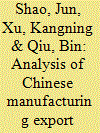

|
|
|
|
|
| Publication |
2012.
|
| Summary/Abstract |
This paper studies the duration of Chinese manufacturing exports and its determinants, using disaggregated 6-digit level Harmonized System product trade data from 1995 to 2007. Cox proportional hazard, Weibull and exponential models are used to examine the effects of various factors on export duration. It is revealed that export duration tends to be rather short-lived. It is also found that GDP and GDP per capita of the export destination have positive effects on export duration, while trade relationships with distant and landlocked countries are generally of shorter duration. In addition, export duration is longer for differentiated and parts and components products, as well as products with large initial trade values. WTO membership is also important for longer export duration. Our empirical analysis suggests that developed markets, such as the USA and the EU, are important to China, and should still be the major sources for Chinese export growth in the long run. Moreover, technical innovation of firms and free trade agreement negotiations will be helpful for sustainable export growth.
|
|
|
|
|
|
|
|
|
|
|
|
|
|
|
|
| 5 |
ID:
086158


|
|
|
|
|
| Publication |
2009.
|
| Summary/Abstract |
Her Patients adored her. One was a ninety year-old man who continued at each session to rail against his father. Another was an exquisite fashion model who was dissatisfied with her nose after half a dozen surgeries.Did it make sense to try again?She treated a stock broker who had amassed a fortune of one hundred and twenty million dollars,yet lived in fear of losing a dime of it.
|
|
|
|
|
|
|
|
|
|
|
|
|
|
|
|
| 6 |
ID:
107398
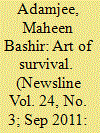

|
|
|
| 7 |
ID:
188596
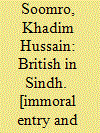

|
|
|
|
|
| Publication |
Karachi, Sain Publishers, 2008.
|
| Description |
248p.hbk
|
|
|
|
|
|
|
|
|
|
|
|
Copies: C:1/I:0,R:0,Q:0
Circulation
| Accession# | Call# | Current Location | Status | Policy | Location |
| 060277 | 954.918/SOO 060277 | Main | On Shelf | General | |
|
|
|
|
| 8 |
ID:
130445
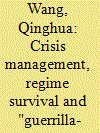

|
|
|
|
|
| Publication |
2014.
|
| Summary/Abstract |
Based on newly available memoirs and previously unexplored policy speeches by insiders, this article conducts a political analysis of the Chinese Communist Party's decision to radically expand college enrollment in June 1999. I argue that the decision exemplifies a "guerrilla-style approach" to policy-making. From late March to early June of 1999 when the radical expansion policy was formulated and legitimated, the top leadership ignored opposition from the Ministry of Education (MOE), overturned established policies and assumed de facto control over MOE bureaucratic power. This abrupt, forceful, disruptive and non-professional policy intervention, which aimed to ensure regime survival in the wake of the Asian financial crisis, was antithetical to regularized educational policy-making in post-Mao China.
|
|
|
|
|
|
|
|
|
|
|
|
|
|
|
|
| 9 |
ID:
132463
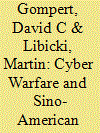

|
|
|
|
|
| Publication |
2014.
|
| Summary/Abstract |
China and the US both recognise that an armed conflict between them would include cyber warfare. But there is a curious and risky failure to connect the tactical military advantages of cyber attacks with the strategic hazards.
|
|
|
|
|
|
|
|
|
|
|
|
|
|
|
|
| 10 |
ID:
153346


|
|
|
|
|
| Summary/Abstract |
It has been well established that better educated individuals enjoy better health and longevity. In theory, the educational gradients in health could be flattening if diminishing returns to improved average education levels and the influence of earlier population health interventions outweigh the gradient-steepening effects of new medical and health technologies. This paper documents how the gradients are evolving in China, a rapidly developing country, about which little is known on this topic. Based on recent mortality data and nationally representative health surveys, we find large and, in some cases, steepening educational gradients. We also find that the gradients vary by cohort, gender and region. Further, we find that the gradients can only partially be accounted for by economic factors. These patterns highlight the double disadvantage of those with low education, and suggest the importance of policy interventions that foster both aspects of human capital for them.
|
|
|
|
|
|
|
|
|
|
|
|
|
|
|
|
| 11 |
ID:
141114
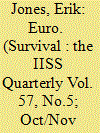

|
|
|
|
|
| Summary/Abstract |
Europe’s monetary union changed fundamentally on 10 July 2015, when German Finance Minister Wolfgang Schäuble tabled a proposal for Greece to leave the euro, temporarily, while it sorted out its public finances and other related economic reforms.1 Until that moment, Europe’s monetary union had been a system of irreversibly fixed exchange rates. Once this proposal was made – by the powerful finance minister of the only country capable of carrying out the threat – membership of Europe’s fixed-exchange-rate regime became conditional. The euro is still a shared multinational currency with a common European Central Bank (ECB), and the European Union (EU) retains its institutions for coordinating macroeconomic policy across the eurozone. Nevertheless, the shift from ‘irreversible’ to ‘conditional’ was important.
|
|
|
|
|
|
|
|
|
|
|
|
|
|
|
|
| 12 |
ID:
128849
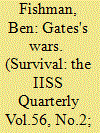

|
|
|
|
|
| Publication |
2014.
|
| Summary/Abstract |
Robert Gates takes deserved pride in his achievements at the Pentagon. But he leaves an important part of the debate about America's future role in the world unaddressed. Very few government officials start in entry-level positions and manage to climb all the way to the role of agency head or cabinet secretary. So it says something about Robert Gates's professional stamina and political acumen that, having begun his intelligence career as a young Soviet analyst at the CIA in 1968, he worked his way up to become the agency's director in 1991. Several stints at the White House, in both Democratic and Republican administrations, helped pave the way. He was the first CIA director to emerge from its professional class (John Brennan only recently became the second), an especially notable achievement for an analyst in an institution that long privileged its clandestine service.
|
|
|
|
|
|
|
|
|
|
|
|
|
|
|
|
| 13 |
ID:
175740


|
|
|
|
|
| Summary/Abstract |
The study addresses the question of whether there is a global pattern of terror organization (TO) lifespan. Based on two datasets which include hundreds of organizations, we show that there is a global statistical law of TO lifespan distribution. This distribution describes populations of TOs in different contexts of periods, geographical locations, ideologies, etc. The data as a whole, as well as its subpopulations, seem to emerge from an exponential distribution, which is formulated as a mathematical model. This model enables the prediction of TOs’ global population decay rate. The findings were obtained by introducing a novel procedure, which formulates and validates this mathematical law for discrete empirical data. We suggest that human behavior generating informational cascades and a positive feedback loop, which influence the number of core members in a TO, may be the source of this global pattern.
|
|
|
|
|
|
|
|
|
|
|
|
|
|
|
|
| 14 |
ID:
075014


|
|
|
|
|
| Publication |
2006.
|
| Summary/Abstract |
Although the greed-grievance approach has brought significant insight to the causes and conduct of civil wars by providing a coherent explanation of armed group motivations, it is increasingly being called into question. This article reconsiders the approach in light of insights gleaned from International Relations theory, specifically Realism. In particular, it will use the levels of analysis approach and the analytical separation between means and ends and between rhetoric and action to critique both greed and grievance explanations. The paper then proposes that the fungible concept of power and the primary motivation of survival provide superior explanations of armed group motivation and, more broadly, the conduct of internal conflicts. A case study of the Lord's Resistance Army (LRA), an armed group which is poorly understood in terms of greed-grievance, will illustrate the functional utility of a power-security approach.
|
|
|
|
|
|
|
|
|
|
|
|
|
|
|
|
| 15 |
ID:
032541
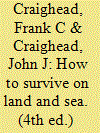

|
|
|
|
|
| Edition |
4th ed.
|
| Publication |
England, Airlife Publishing, 1986.
|
| Description |
xv, 412pHbk
|
| Standard Number |
0906393647
|
|
|
|
|
|
|
|
|
|
|
|
Copies: C:1/I:0,R:0,Q:0
Circulation
| Accession# | Call# | Current Location | Status | Policy | Location |
| 029510 | 613.69/CRA 029510 | Main | On Shelf | General | |
|
|
|
|
| 16 |
ID:
132474
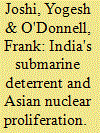

|
|
|
|
|
| Publication |
2014.
|
| Summary/Abstract |
New Delhi's plans for nuclear-armed submarines could undermine efforts to restrict fissile materials, and set off a naval arms race.
India has become a more or less accepted member of the global nuclear order, but the state's emerging undersea deterrent continues to be a source of concern. Its efforts to create nuclear-armed submarines began in the 1980s, and technical progress was slow during the project's first three decades. India has recently made some bold strides, however, and in 2009 unveiled its first nuclear submarine, INS Arihant. The boat is now undergoing sea trials, and is scheduled to be introduced into the Indian Navy by early 2015. Several similar vessels are under construction: New Delhi plans to field a fleet of between four and six nuclear-armed submarines by the end of the decade.
|
|
|
|
|
|
|
|
|
|
|
|
|
|
|
|
| 17 |
ID:
141117
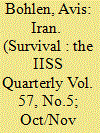

|
|
|
|
|
| Summary/Abstract |
Negotiation is an essential tool of diplomacy, as weapons are of war. The recently concluded Iran deal represents a major diplomatic achievement arrived at by long and patient negotiation. Its significance is likely to go far beyond the terms of the accord itself and must be judged in a broader diplomatic and strategic context. The Iran nuclear deal is important first and foremost for the stringent limits it places on Iran’s nuclear programmes – the principal goal of the negotiations. US President Barack Obama and Secretary of State John Kerry have been quick to deny that expectations of broader detente were in any way the premise for the negotiation. But the agreement does, in fact, have the potential to open up the frozen dialogue between the US and Iran and permit a broader discussion of urgent regional issues. This potential unblocking of the relationship could be one of the agreement’s great rewards.
|
|
|
|
|
|
|
|
|
|
|
|
|
|
|
|
| 18 |
ID:
190008


|
|
|
| 19 |
ID:
144760


|
|
|
|
|
| Summary/Abstract |
Life in fishing communities is difficult in most countries in South East Asia. In the Philippines, where this study took place, income from fishing has become even more disastrously low in recent years, with more and more fishing grounds yielding less fish due to overexploitation and uncontrolled illegal fishing. In the fishing community considered in this paper, aside from diversifying sources of income, kinship ties provide a safety net in a rather different sense. People deploy kinship in a deliberately strategic way: they limit their everyday interactions with kin, choosing to be intimate only with a select few. The rationale behind this practice is clear: by choosing a select few with whom they have a reciprocal relationship when it comes to sharing goods and services, they are able to manage their resources well and survive tough economic times. Such a practice of 'forgetting kin', however, has implications for the community's conceptualization of the configurations of kinship, as well as its social cohesion and prospects for political activism, undermining the very economic survival it tries so hard to serve.
|
|
|
|
|
|
|
|
|
|
|
|
|
|
|
|
| 20 |
ID:
128845


|
|
|
|
|
| Publication |
2014.
|
| Summary/Abstract |
Narratives that dramatise and simplify conflicts should be corroded by exposure to complex reality. Yet they retain their mobilising power in the Middle East, topped up by conspiracy theories. To an outside observer, the picture that the Middle East conflict landscape offers is indeed complex and confusing. Littered with interlocking and overlapping conflicts, there is a wealth of narratives that allegedly explain why this is so, outlining who is the designated enemy or ally of whom, and for what reason. But when one compares the reality on the ground to these narratives, things often look quite different. In many instances, it almost seems that the conflicting parties have a distinct preference for allying not with their supposed brothers in spirit, but with their ideological opposites. The proverb 'the enemy of my enemy is my friend' seems a better guide to the Middle East conflict landscape. This raises questions about the role that narratives have played, and still play, in Middle East conflicts, and how much these stories produce or only mirror realities on the ground.
|
|
|
|
|
|
|
|
|
|
|
|
|
|
|
|
|
|
|
|
|